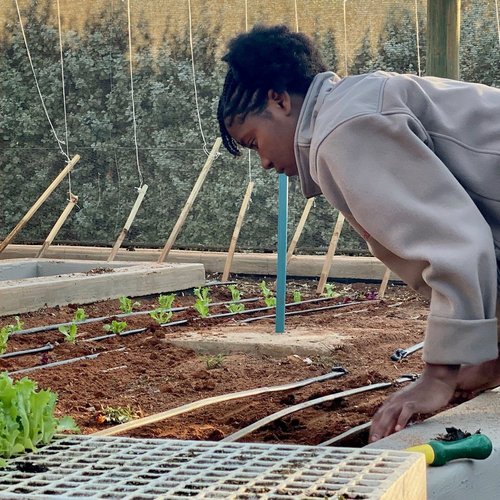he who plants a garden, plants happiness
“Growing your own food is like printing your own money” (so the saying goes). For us at Wolwedans, it's perhaps of even greater importance that it also soothes the soul, teaches you patience by forcing you to slow down, and connects you with Mother Earth. Gardening is even said to evoke a sense of “Happiness” and will hence take centre stage at Wolwedans.
Our vegetable and herb gardens have been a great success from the start and have given Wolwedans guests the opportunity to observe the true meaning of the global “from farm to fork” trend. We are often asked by visitors, “How on earth do you get this amazing fresh salad to the desert?” Naturally, this results in a visit to the garden: “Let us show you how…” The Wolwedans Heart & Home Tour grew out of such guest curiosity regarding how we make the Wolwedans magic happen, and our small green space, surrounded by a big, arid and harsh desert environment, has always been a highlight. Maybe subconsciously it was the symbolism of life against all odds and the energy of a garden… Be that as it may, a visit to the garden also helped to bring the sustainability ‘story’ to life.
Our Salad Story seems to be one from our journey that has a profound impact on people in terms of understanding the bigger picture and what sustainability looks like. So we decided to share it with you too:
Wolwedans Salad Story
Most lodges in Namibia serve iceberg salad, primarily because it travels so well and lasts so long. Wolwedans did so as well until 10+ years ago when we started to plant lettuce at the Village. The aim was actually to improve the culinary offering with a variety of fresh lettuce varieties that were less boring than iceberg; in truth, it had nothing to do with sustainability and carbon back then. But that changed...
By way of context, it's important to understand that 90% of iceberg lettuce consumed in Namibia hails from neighbouring South Africa due to its more favourable climate. One can safely say that from the time the salad was harvested (in a far-away land) until the time it is served to a guest in the lodge, up to two weeks can pass. A massive logistical machine needs to keep the salad in motion: Think refrigeration (energy) and thousands of kilometres transported by truck (fuel), all resulting in a massive carbon footprint and numerous middlemen making a quick, easy buck. The farmer generally gets 20% of the value although s/he puts in 80% of the effort! Never mind that the salad tastes like nothing when it gets there, half of it is thrown away (the wilted outer leaves), and not much nutritional value remains.
If one then compares this madness with organic, fresh lettuce available in many varieties, harvested at Wolwedans in the morning and consumed by lunchtime, the message sinks in. There is no need to burn tons of fossil fuel and coal to put a salad on the table – direct from farm to fork is far better.
Perhaps illustrative stories like this can serve as a catalyst for change and a new ‘consciousness’ regarding the way we consume, what we eat, and where things come from... That is our aim.
Considering the critical experience and expertise we have gained through our journey, vegetable production will become a central theme and additional leg for the Wolwedans Foundation to stand on going forward. Although this will have financial sustainability benefits, we are as motivated by its prospect for positive impact through training and health benefits, benefits to the planet through reduced carbon emissions, and for its potential to inspire others to follow suit.
Through The AridEden Project, we will be diversifying our production with new staple vegetables, such as carrots, beetroot, cabbage, potatoes, and pumpkins. Space will be available in the beautiful new greenhouse that the Wolwedans Foundation started to build in 2019 (fortunately 80% completed before COVID hit Namibia). This designer greenhouse adds immense value to the Wolwedans Village and the people (guests and team alike), and to the Foundation itself as all produce from the garden is sold to the commercial entity and surplus to neighbouring lodges.


